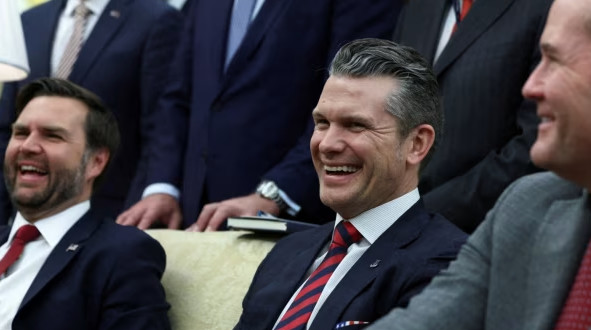Welcome back. We have some news to share with our readers.
This is my final Europe Express Weekend newsletter for The Financial Times. I am retiring. Ben Hall will succeed me. You can reach him at ben.hall@ft.com.
I’ve been at the FT for 28 years, but my journalism career began 16 years before that, in 1981, as a correspondent for Reuters. While I find some similarities between the current state of Europe and that in 1981, there are also significant differences.
Tensions in the past and present
In the late 1970s and 1980s, tensions between East-West relations were high. In 1979 the Soviet Union invaded Afghanistan. In Poland, communist authorities put martial law in place two years later to suppress the independent union Solidarity.
In 1983, an exercise by the Nato codenamed Able Archer 83 The ever-suspicious Soviet leaders were alarmed. This was the most dangerous time of the Cold War in terms the use of nuclear weapons.
In contrast, the Able Archer case was completely unknown to the western public (and the ultra-secretive Soviet Union, as well).
Tensions in Europe today are primarily related to the Ukraine War and to Washington’s and Moscow’s behaviour. A major difference between early 1980s and the present is the rupture in the transatlantic partnership, which was highlighted by this week’s leaks of secret national security talks in Washington.

A second difference is the Trump administration’s attempts to reach out to Russia. It’s ruthless, great-power political. This is not like the Reagan administration’s cooperation with Mikhail Gorbachev, which was based on a hope or perception of a loosening up of international tensions and a liberalisation in Moscow.
Worse still, the US interest in taking an economic stake in Ukraine, while conniving at the country’s partial annexation by Russia, summons — to some people in central and eastern Europe — the spectre of the partitions of Poland in the 18th century by three bigger powers.
Limitations of historical analogy
These analogies can be tempting, but they are not always useful.
Last month, Martin Conway, the chair of the history department at Oxford University, said it well:
There are few Oxford tutors who have not at times compared the likes of Churchill and Henry VIII, or even the fall of Habsburg Empire with the events in 1989.
“Such exercises are, on the whole, exercises in thinking rather than suggestions of a real connection between different individuals and eras; and more sustained discussion of these comparisons tends to move rapidly towards emphasising the many differences between contexts and circumstances …
“Whatever else we might think about Donald Trump, the Alternative für Deutschland and the Putin regime, they clearly have a novelty which negates any simple equivalence between historical precedents and the disconcerting present.”
Berlusconi and the EU
Conway’s words are all true. In my FT career, I’ve sometimes been tempted to draw historical comparisons that, on closer inspection, don’t really hold up.
When I was based in Brussels, I once compared the EU to the 16th-century Spanish empire: multinational, often slow-moving and administered by a European Commission whose departments, known as directorates-general, struck me as curiously similar to the bureaucratic policy councils of imperial Spain’s government.

As the FT Rome correspondent, I resisted being pressured to compare Silvio Mussolini (then Italian Premier) to Berlusconi.
A comparison between Mussolini and modern Italy was not logical to me. The political and economic circumstances in Mussolini’s day were so different. Modern Italy is a democratic, prosperous country integrated with the West.
Still, Berlusconi did bear a certain resemblance to Achille LauroA flamboyant Italian politician and businessman who rose to fame in the 1950s.

You can also find out more about the following: Italy RebornMark Gilbert describes Lauro in his history of Italy during the years following World War II:
“[He had] High-living, beautiful mistresses and football are all part of the package. [He] “I was a proto-Silvio Bernlusconi. An entrepreneur who could connect with a populace that had lost faith in politics and was looking for quick solutions.”
Nigel Farage & Vichy
Another comparison I’ve never made, and not only because I have only occasionally written about domestic British politics, is that which some people have drawn between the political slogans of Nigel Farage’s Reform UK party and Philippe Pétain’s Vichy regime in 1940s France.
The Pétainist slogan was “travail, famille, patrie” — work, family, fatherland (see my colleague John Thornhill’s review of Julian Jackson’s superb book on Pétain’s postwar trial).
Reform UK slogan is “family, community, country” — so two of the three words are basically the same.
Let others think about the significance of this. I believe that Vichy is Vichy, and the right-wing populism of today in Britain operates within a completely different context.
Trump and Nero
One last example. Earlier in the month, Claude Malhuret a French senator was arrested. compared Trump to Nero – the Roman emperor of the first century:
Washington has been transformed into Nero’s Court, with a ferocious emperor and submissive courtiers, as well as a buffoon on Ketamine who is in charge of purging civil service.
French politicians can say whatever they like, of course. Malhuret’s comparison seems a bit fanciful to me.
Still, because we’re talking about comparisons to Roman emperors, let me mention a personal favourite: the late French president François Mitterrand’s unforgettable description Margaret Thatcher was described as having “the eyes and mouth of Marilyn Monroe and Caligula”.

Mitterrand was a man of mystery.
The French and British Past
We should not ignore the study of historical events just because we are careful when using analogies.
A knowledge of past events can be very helpful to understand how individual countries think and behave, particularly now that the US and Ukraine wars are forcing Europe to take a more independent stance.
Luuk van Middledelaar, the head of the Brussels Institute for Geopolitics wrote an illuminating article He noticed: He noticed:
“France . . . rediscovers, during such historical moments, the bedrock of its centuries-old history and its role as a European impetus — as embodied by successive kings, generals and presidents.
“The UK also has a national identity to draw upon, as well as reserves of historic action that predates the Atlantic Alliance and membership in the EU.”
The German Question
van Middelaar stated that Germany has a different approach to the situation. He wrote:
“The Federal Republic is a product of Europe’s postwar security order; its life and identity are bound up with the US role as its protector …
“This may explain why the Germans were so distraught during the first month of Trump 2.0, more than any other European nation . . . Germany is losing its historic footing.”
But van Middelaar sees a chance that Germany, under its chancellor-in-waiting Friedrich Merz, may rise to the occasion if he carries out his ambitious plans for spending on defence and infrastructure.
So, too, do some of Merz’s colleagues, such as Markus Söder, the Bavarian state premier:
“Germany wants to go back to the Middle East, Germany wants more.”
Let’s see.
The Europe Express weekend news newsletter was written with great pleasure by me.
Goodbye, everyone.
This topic is discussed in more detail
The west’s golden years over? — an essay by Florence Gaub for The Hague Centre for Strategic Studies.
Tony’s Picks for the Week
Recep Tayyip Erdoğan, Turkey’s president, is capitalising on an unusually permissive international climate to crack down on his domestic opponents, Gönül Tol of the Washington-based Middle East Institute writes for the FT.
The new level of Russian bureaucracy Andrey Pertsev reports for Carnegie Politika that a new group is being formed, consisting of people who are close to Vladimir Putin, and they have been tasked to keep an eye on those in formal charge.
 Costa News Spain Breaking News | English News in Spain.
Costa News Spain Breaking News | English News in Spain.







